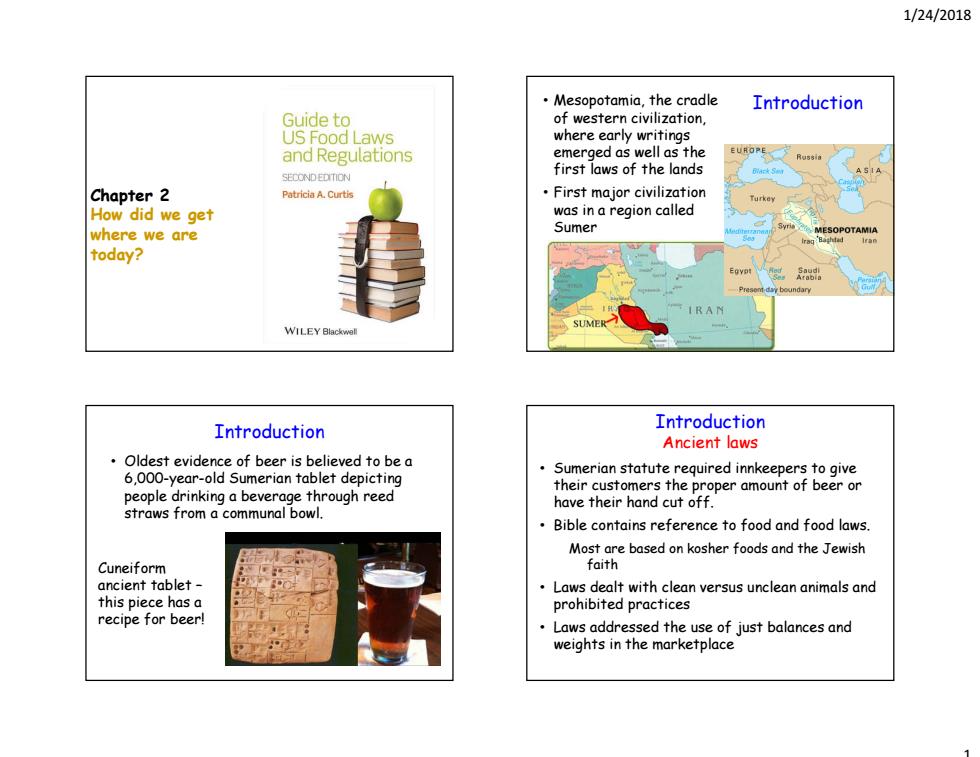
1/24/2018 Mesopotamia,the cradle Introduction Guide to of western civilization, US Food Laws where early writings and Regulations emerged as well as the EUROPE SECONDEDITION first laws of the lands Chapter 2 PatriciaA.Curtis First major civilization Turkey How did we get was in a region called where we are Sumer today? WILEY Blackwel SUMER Introduction Introduction Ancient laws Oldest evidence of beer is believed to be a Sumerian statute required innkeepers to give 6,000-year-old Sumerian tablet depicting their customers the proper amount of beer or people drinking a beverage through reed have their hand cut off. straws from a communal bowl. Bible contains reference to food and food laws. Most are based on kosher foods and the Jewish Cuneiform faith ancient tablet- Laws dealt with clean versus unclean animals and this piece has a prohibited practices recipe for beer! Laws addressed the use of just balances and weights in the marketplace
1/24/2018 1 Chapter 2 How did we get where we are today? • Mesopotamia, the cradle of western civilization, where early writings emerged as well as the first laws of the lands • First major civilization was in a region called Sumer Introduction • Oldest evidence of beer is believed to be a 6,000-year-old Sumerian tablet depicting people drinking a beverage through reed straws from a communal bowl. Cuneiform ancient tablet – this piece has a recipe for beer! Introduction Introduction Ancient laws • Sumerian statute required innkeepers to give their customers the proper amount of beer or have their hand cut off. • Bible contains reference to food and food laws. Most are based on kosher foods and the Jewish faith • Laws dealt with clean versus unclean animals and prohibited practices • Laws addressed the use of just balances and weights in the marketplace
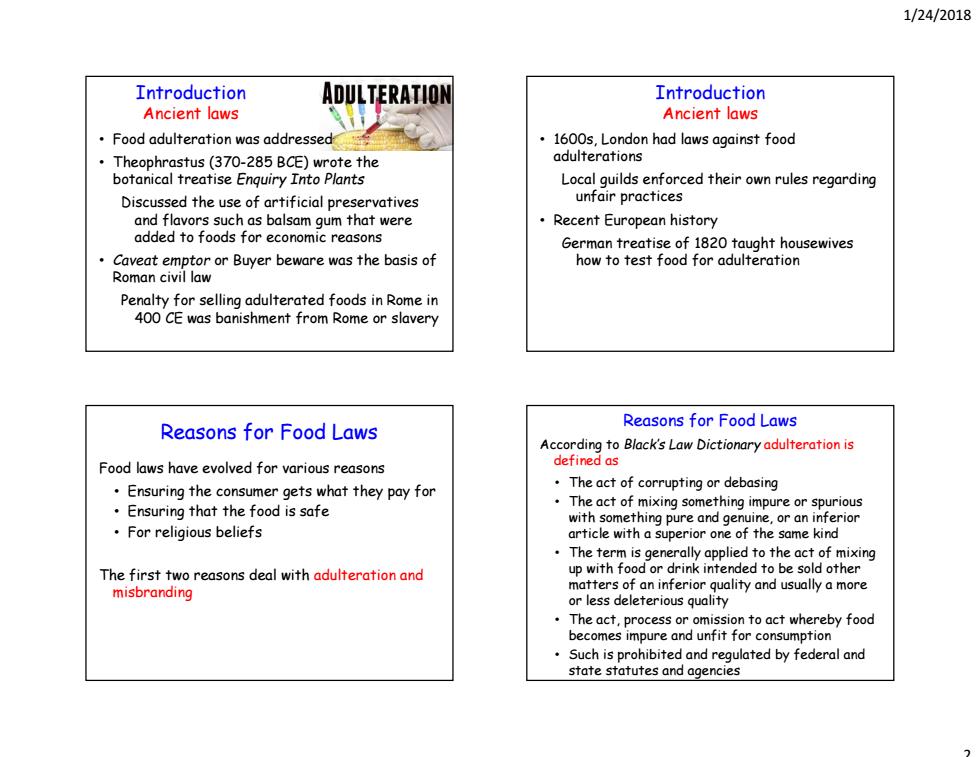
1/24/2018 Introduction ADULTERATION Introduction Ancient laws Ancient laws Food adulteration was addressed 1600s,London had laws against food Theophrastus(370-285 BCE)wrote the adulterations botanical treatise Enguiry Into Plants Local guilds enforced their own rules regarding Discussed the use of artificial preservatives unfair practices and flavors such as balsam gum that were Recent European history added to foods for economic reasons German treatise of 1820 taught housewives Caveat emptor or Buyer beware was the basis of how to test food for adulteration Roman civil law Penalty for selling adulterated foods in Rome in 400 CE was banishment from Rome or slavery Reasons for Food Laws Reasons for Food Laws According to Black's Law Dictionary adulteration is Food laws have evolved for various reasons defined as Ensuring the consumer gets what they pay for The act of corrupting or debasing The act of mixing something impure or spurious Ensuring that the food is safe with something pure and genuine,or an inferior For religious beliefs article with a superior one of the same kind The term is generally applied to the act of mixing The first two reasons deal with adulteration and up with food or drink intended to be sold other misbranding matters of an inferior quality and usually a more or less deleterious quality The act,process or omission to act whereby food becomes impure and unfit for consumption Such is prohibited and regulated by federal and state statutes and agencies
1/24/2018 2 Introduction Ancient laws • Food adulteration was addressed • Theophrastus (370-285 BCE) wrote the botanical treatise Enquiry Into Plants Discussed the use of artificial preservatives and flavors such as balsam gum that were added to foods for economic reasons • Caveat emptor or Buyer beware was the basis of Roman civil law Penalty for selling adulterated foods in Rome in 400 CE was banishment from Rome or slavery Introduction Ancient laws • 1600s, London had laws against food adulterations Local guilds enforced their own rules regarding unfair practices • Recent European history German treatise of 1820 taught housewives how to test food for adulteration Reasons for Food Laws Food laws have evolved for various reasons • Ensuring the consumer gets what they pay for • Ensuring that the food is safe • For religious beliefs The first two reasons deal with adulteration and misbranding Reasons for Food Laws According to Black’s Law Dictionary adulteration is defined as • The act of corrupting or debasing • The act of mixing something impure or spurious with something pure and genuine, or an inferior article with a superior one of the same kind • The term is generally applied to the act of mixing up with food or drink intended to be sold other matters of an inferior quality and usually a more or less deleterious quality • The act, process or omission to act whereby food becomes impure and unfit for consumption • Such is prohibited and regulated by federal and state statutes and agencies

1/24/2018 Reasons for Food Law Corrupted milk|How melamine got into China's dairy products: Intentional Adulteration acts intended to cause wide-scale harm to public health,including acts of terrorism targeting the food supply 2007,animal illness and death was linked to pet food from China Also linked to dairy products sold for human consumption Renal failure due to contamination of the food by melamine NH, Melamine used as fake protein and fat Main use is to make plastic HN N NH Melamine Industrial chemical abused by food producers Reasons for Food Laws Food Emergency Response Network-FERN integrates the nation's food-testing laboratories at the local,state,and federal levels into a network that responds to emergencies involving biological, chemical,or radiological contamination of food FERN structure is organized to ensure federal and state inter-agency participation and cooperation in the formation,development,and operation of 9 the network
1/24/2018 3 Intentional Adulteration acts intended to cause wide-scale harm to public health, including acts of terrorism targeting the food supply 2007, animal illness and death was linked to pet food from China • Also linked to dairy products sold for human consumption • Renal failure due to contamination of the food by melamine • Melamine used as fake protein • Main use is to make plastic Reasons for Food Law Reasons for Food Laws Food Emergency Response Network - FERN • integrates the nation's food-testing laboratories at the local, state, and federal levels into a network that responds to emergencies involving biological, chemical, or radiological contamination of food • FERN structure is organized to ensure federal and state inter-agency participation and cooperation in the formation, development, and operation of the network
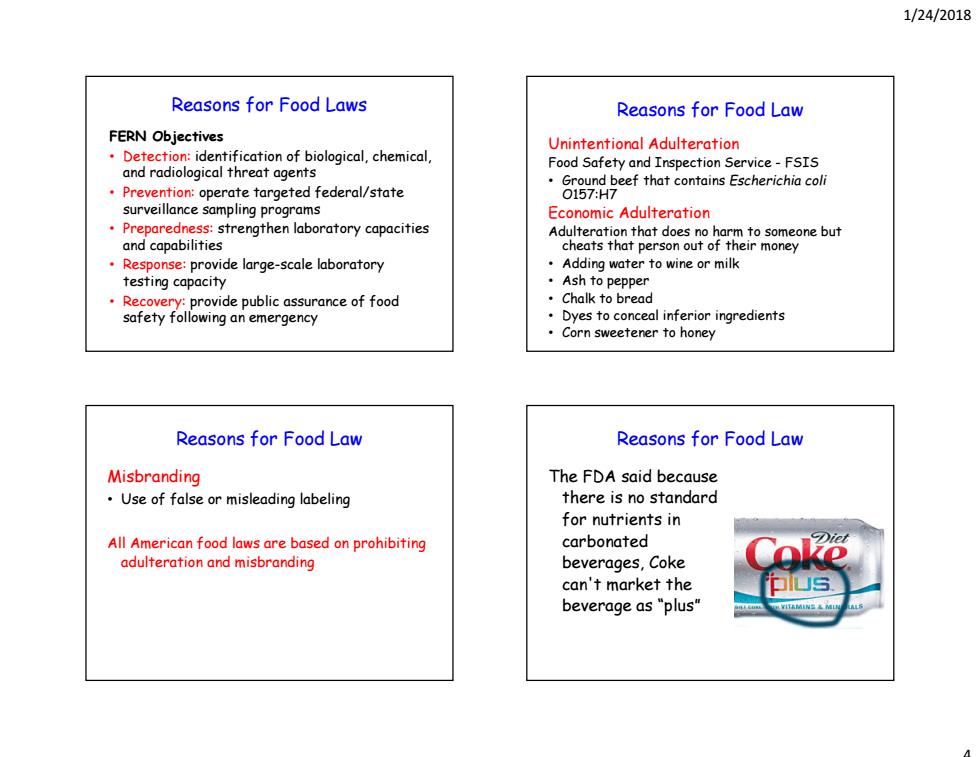
1/24/2018 Reasons for Food Laws Reasons for Food Law FERN Objectives Unintentional Adulteration Detection:identification of biological,chemical Food Safety and Inspection Service-FSIS and radiological threat agents Prevention:operate targeted federal/state eefthat contains Escherichia coli surveillance sampling programs Economic Adulteration Preparedness:strengthen laboratory capacities Adulteration that does no harm to someone but and capabilities cheats that person out of their money Response:provide large-scale laboratory Adding water to wine or milk testing capacity ·Ash to pepper Recovery:provide public assurance of food ·Chalk to bread safety following an emergency Dyes to conceal inferior ingredients Corn sweetener to honey Reasons for Food Law Reasons for Food Law Misbranding The FDA said because Use of false or misleading labeling there is no standard for nutrients in All American food laws are based on prohibiting carbonated adulteration and misbranding beverages,Coke can't market the beverage as "plus
1/24/2018 4 Reasons for Food Laws FERN Objectives • Detection: identification of biological, chemical, and radiological threat agents • Prevention: operate targeted federal/state surveillance sampling programs • Preparedness: strengthen laboratory capacities and capabilities • Response: provide large-scale laboratory testing capacity • Recovery: provide public assurance of food safety following an emergency Unintentional Adulteration Food Safety and Inspection Service - FSIS • Ground beef that contains Escherichia coli O157:H7 Economic Adulteration Adulteration that does no harm to someone but cheats that person out of their money • Adding water to wine or milk • Ash to pepper • Chalk to bread • Dyes to conceal inferior ingredients • Corn sweetener to honey Reasons for Food Law Misbranding • Use of false or misleading labeling All American food laws are based on prohibiting adulteration and misbranding Reasons for Food Law The FDA said because there is no standard for nutrients in carbonated beverages, Coke can't market the beverage as “plus” Reasons for Food Law

1/24/2018 Reasons for Food Law American Food Laws Early food laws These products are misbranded because Earliest type of food laws established in their labels are the colonies were set by trade guilds misleading. They wanted quality standards to The labels are designed to ensure they had repeat customers imply that the product is 100%orange/tangerine Anyone in the trade guild caught juice or grape juice adulterating foods and selling them Neither orange/tangerine cheap were removed from the quild and juice nor grape juice is forced out of business the predominant juice in the products American Food Laws American Food Laws Early food laws Early food laws After independence was gained from First food laws in the US were based on the UK,Congress was protective of regulations from England states'rights and resisted passing federal laws that infringed on state Massachusetts Bay Colony commerce -1630,Nicholas Knopf was fined for First food laws passed selling water as a cure for scurvy were at the state level -1641,passed a food adulteration law did not cover goods shipped from one that established inspection of beef, state to another pork,and fish
1/24/2018 5 These products are misbranded because their labels are misleading. The labels are designed to imply that the product is 100% orange/tangerine juice or grape juice Neither orange/tangerine juice nor grape juice is the predominant juice in the products Reasons for Food Law American Food Laws Early food laws • Earliest type of food laws established in the colonies were set by trade guilds • They wanted quality standards to ensure they had repeat customers • Anyone in the trade guild caught adulterating foods and selling them cheap were removed from the guild and forced out of business • After independence was gained from the UK, Congress was protective of states’ rights and resisted passing federal laws that infringed on state commerce • First food laws passed - were at the state level - did not cover goods shipped from one state to another American Food Laws Early food laws • First food laws in the US were based on regulations from England • Massachusetts Bay Colony - 1630, Nicholas Knopf was fined for selling water as a cure for scurvy - 1641, passed a food adulteration law that established inspection of beef, pork, and fish American Food Laws Early food laws
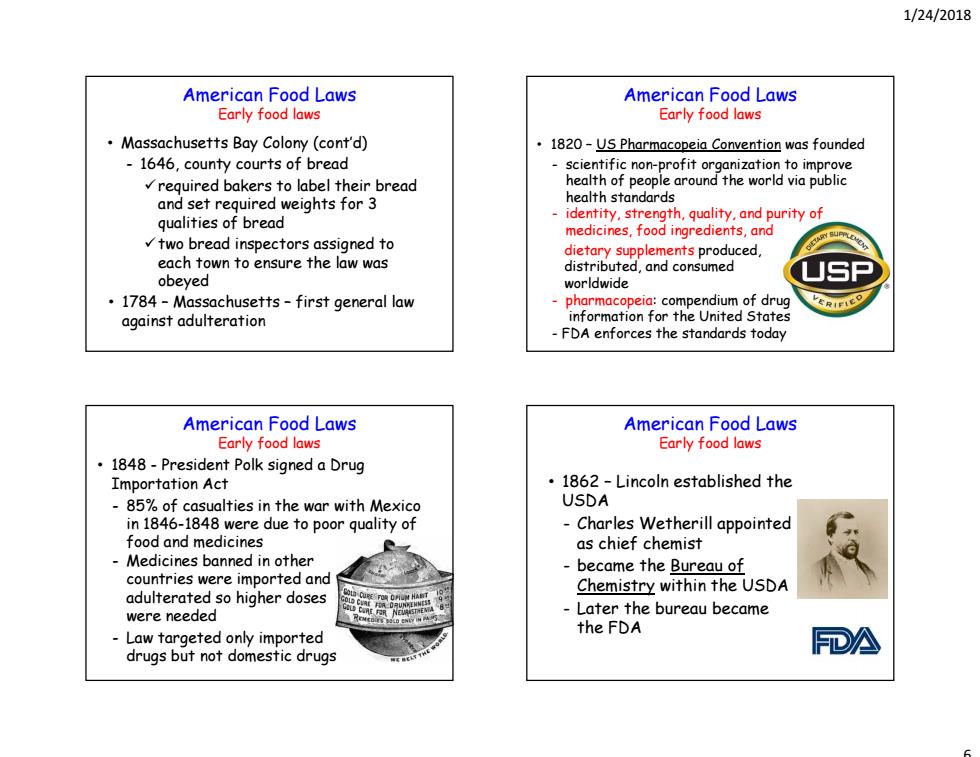
1/24/2018 American Food Laws American Food Laws Early food laws Early food laws Massachusetts Bay Colony (cont'd) 1820-US Pharmacopeia Convention was founded -1646,county courts of bread scientific non-profit organization to improve required bakers to label their bread health of people around the world via public and set required weights for 3 health standards qualities of bread identity.strength,quality,and purity of medicines,food ingredients,and Y SU two bread inspectors assigned to dietary supplements produced, each town to ensure the law was distributed,and consumed obeyed worldwide SP 1784-Massachusetts-first general law pharmacopeia:compendium of drug against adulteration information for the United States FDA enforces the standards today American Food Laws American Food Laws Early food laws Early food laws 1848-President Polk signed a Drug Importation Act 1862-Lincoln established the 85%of casualties in the war with Mexico USDA in 1846-1848 were due to poor quality of -Charles Wetherill appointed food and medicines as chief chemist Medicines banned in other became the Bureau of countries were imported and Chemistry within the USDA adulterated so higher doses were needed Later the bureau became the FDA Law targeted only imported drugs but not domestic drugs FDA
1/24/2018 6 • Massachusetts Bay Colony (cont’d) - 1646, county courts of bread required bakers to label their bread and set required weights for 3 qualities of bread two bread inspectors assigned to each town to ensure the law was obeyed • 1784 – Massachusetts – first general law against adulteration American Food Laws Early food laws • 1820 – US Pharmacopeia Convention was founded - scientific non-profit organization to improve health of people around the world via public health standards - identity, strength, quality, and purity of medicines, food ingredients, and dietary supplements produced, distributed, and consumed worldwide - pharmacopeia: compendium of drug information for the United States - FDA enforces the standards today American Food Laws Early food laws • 1848 - President Polk signed a Drug Importation Act - 85% of casualties in the war with Mexico in 1846-1848 were due to poor quality of food and medicines - Medicines banned in other countries were imported and adulterated so higher doses were needed - Law targeted only imported drugs but not domestic drugs American Food Laws Early food laws • 1862 – Lincoln established the USDA - Charles Wetherill appointed as chief chemist - became the Bureau of Chemistry within the USDA - Later the bureau became the FDA American Food Laws Early food laws

1/24/2018 American Food Laws American Food Laws Early food laws Early food laws The US became more urban and industrialized 1880-Chief chemist of the USDA, -marketplaces were developed to purchase food Peter Collier adulteration became a bigger problem to meet -Recommended a national food and drug the demand law technology led to new ingredients and Americans felt food regulation was a products that were not safe state issue and a federal issue economic and unsafe adulteration was a Then as today,federal agencies problem (executive branch)cannot regulate food states had laws dealing with adulteration but industry until Congress(legislative these laws did not apply to interstate branch)authorizes the agency to do so commerce Only recommendations can be made American Food Laws American Food Laws Early food laws Early food laws 1877-State Boards of Health Level of adulteration in New york in 1882 formulated laws against adulteration Item -Published statistics on adulteration in Butter 40 21 52.5 the food supply Olive oil 16 9 56.3 Difficulties occurred in enforcing the Baking powder 84 8 9.5 117 law due to lack of explicit details in the Flour 8 6.8 Spices 180 112 62.2 law Coffee (ground)21 19 90.5 State enacted laws provide too much Candy (yellow)10 > 70.0 variation in laws between states Brandy 25 16 64.0 4 60
1/24/2018 7 • The US became more urban and industrialized - marketplaces were developed to purchase food - adulteration became a bigger problem to meet the demand - technology led to new ingredients and products that were not safe - economic and unsafe adulteration was a problem - states had laws dealing with adulteration but these laws did not apply to interstate commerce American Food Laws Early food laws • 1880 – Chief chemist of the USDA, Peter Collier - Recommended a national food and drug law - Americans felt food regulation was a state issue and a federal issue • Then as today, federal agencies (executive branch) cannot regulate food industry until Congress (legislative branch) authorizes the agency to do so • Only recommendations can be made American Food Laws Early food laws • 1877 – State Boards of Health formulated laws against adulteration - Published statistics on adulteration in the food supply - Difficulties occurred in enforcing the law due to lack of explicit details in the law - State enacted laws provide too much variation in laws between states American Food Laws Early food laws Item # samples tested # found to be adulterated Percent adulterated Butter 40 21 52.5 Olive oil 16 9 56.3 Baking powder 84 8 9.5 Flour 117 8 6.8 Spices 180 112 62.2 Coffee (ground) 21 19 90.5 Candy (yellow) 10 7 70.0 Brandy 25 16 64.0 Sugar 67 4 6.0 American Food Laws Early food laws Level of adulteration in New York in 1882
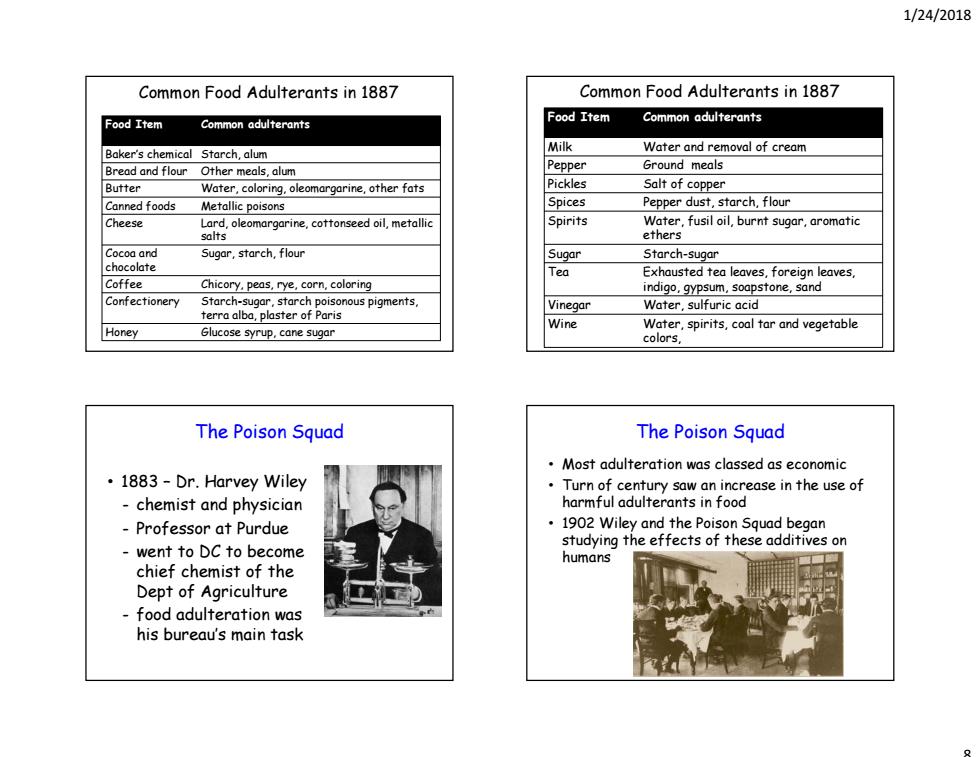
1/24/2018 Common Food Adulterants in 1887 Common Food Adulterants in 1887 Food Item Common adulterants Food Item Common adulterants Baker's chemical Starch,alum Milk Water and removal of cream Bread and flour Other meals,alum Pepper Ground meals Butter Water,coloring.oleomargarine,other fats Pickles Salt of copper Canned foods Metallic poisons Spices Pepper dust,starch,flour Cheese Lard,oleomargarine.cottonseed oil,metallic Spirits Water,fusil oil,burnt sugar,aromatic salts ethers Cocoa and Sugar,starch,flour Sugar Starch-sugar chocolate Tea Exhausted tea leaves,foreign leaves, Coffee Chicory.peas,rye,corn,coloring indigo,gypsum,soapstone,sand Confectionery Starch-sugar,starch poisonous pigments, Vinegar Water,sulfuric acid terra alba,plaster of Paris Wine Honey Glucose syrup,cane sugar Water,spirits,coal tar and vegetable colors, The Poison Squad The Poison Squad Most adulteration was classed as economic 1883-Dr.Harvey Wiley Turn of century saw an increase in the use of -chemist and physician harmful adulterants in food -Professor at Purdue 1902 Wiley and the Poison Squad began studying the effects of these additives on -went to DC to become humans chief chemist of the Dept of Agriculture food adulteration was his bureau's main task
1/24/2018 8 Food Item Common adulterants Baker’s chemical Starch, alum Bread and flour Other meals, alum Butter Water, coloring, oleomargarine, other fats Canned foods Metallic poisons Cheese Lard, oleomargarine, cottonseed oil, metallic salts Cocoa and chocolate Sugar, starch, flour Coffee Chicory, peas, rye, corn, coloring Confectionery Starch-sugar, starch poisonous pigments, terra alba, plaster of Paris Honey Glucose syrup, cane sugar Common Food Adulterants in 1887 Food Item Common adulterants Milk Water and removal of cream Pepper Ground meals Pickles Salt of copper Spices Pepper dust, starch, flour Spirits Water, fusil oil, burnt sugar, aromatic ethers Sugar Starch-sugar Tea Exhausted tea leaves, foreign leaves, indigo, gypsum, soapstone, sand Vinegar Water, sulfuric acid Wine Water, spirits, coal tar and vegetable colors, Common Food Adulterants in 1887 • 1883 – Dr. Harvey Wiley - chemist and physician - Professor at Purdue - went to DC to become chief chemist of the Dept of Agriculture - food adulteration was his bureau’s main task The Poison Squad • Most adulteration was classed as economic • Turn of century saw an increase in the use of harmful adulterants in food • 1902 Wiley and the Poison Squad began studying the effects of these additives on humans The Poison Squad
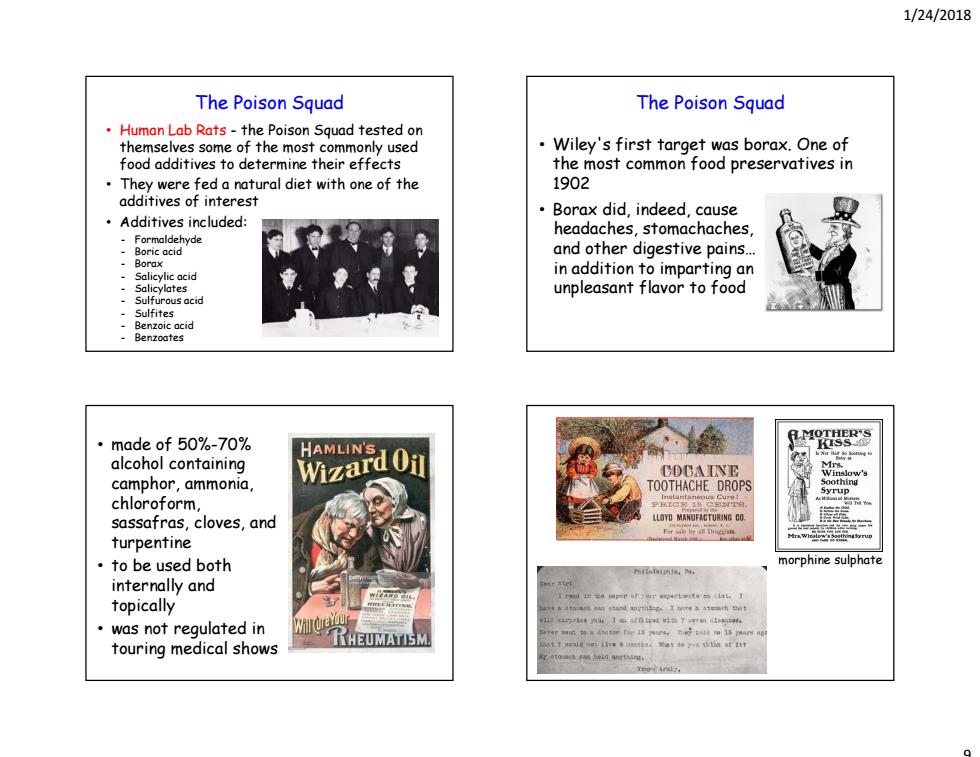
1/24/2018 The Poison Squad The Poison Squad Human Lab Rats-the Poison Squad tested on themselves some of the most commonly used Wiley's first target was borax.One of food additives to determine their effects the most common food preservatives in They were fed a natural diet with one of the 1902 additives of interest Borax did,indeed,cause ·Additives included: headaches,stomachaches, Formaldehyde 、 Boric acid and other digestive pains. Borax Salicylic acid in addition to imparting an Salicylates unpleasant flavor to food Sulfurous acid Sulfites cid ·made of50%-70% alcohol containing COCAINE camphor,ammonia TOOTHACHE DROPS chloroform sassafras,cloves,and LLOYD MANUFACTURING CO. turpentine ·to be used both morphine sulphate internally and topically ·was not regulated in touring medical shows
1/24/2018 9 • Human Lab Rats - the Poison Squad tested on themselves some of the most commonly used food additives to determine their effects • They were fed a natural diet with one of the additives of interest • Additives included: - Formaldehyde - Boric acid - Borax - Salicylic acid - Salicylates - Sulfurous acid - Sulfites - Benzoic acid - Benzoates The Poison Squad • Wiley's first target was borax. One of the most common food preservatives in 1902 • Borax did, indeed, cause headaches, stomachaches, and other digestive pains… in addition to imparting an unpleasant flavor to food The Poison Squad • made of 50%-70% alcohol containing camphor, ammonia, chloroform, sassafras, cloves, and turpentine • to be used both internally and topically • was not regulated in touring medical shows morphine sulphate

1/24/2018 The Poison Squad The Poison Squad 1898-Wiley established a committee Poison squad brought the food additives on food standards for food purity issues to the American consumers These standards later became 1905-Pres.Roosevelt recommended a law mandatory law for many states be passed to regulate interstate commerce of adulterated and misbranded 1902-Biologics Control Act was foods,drinks,and drugs introduced to ensure serums and 1906-Pure Food and Drug Act was passed vaccines were safe Summary video on the poison squad Wiley report of their findings was also https://www.youtube.com/watch?v=hJsQ critical of food preparation industry NGw17kk but Congress ignored these findings "The Jungle The Jungle by Upton Sinclair excerpts 1905 -"Sinclair spent seven "There was never the least attention paid to what was weeks gathering information while working incognito in the m23aa82g9e9o meatpacking plants of the th Chicago stockyards." Fueled the efforts for the enactment of the Pure Food and Summary video of The Jungle https://www.youtube.com/watch?v=DdK9Rv2xvig Drug Act Exposed unsanitary conditions in https://www.youtube.com/watch?v=ZZnYr-RmAD4 the Chicago meat packing industry 0
1/24/2018 10 • 1898 – Wiley established a committee on food standards for food purity • These standards later became mandatory law for many states • 1902 – Biologics Control Act was introduced to ensure serums and vaccines were safe • Wiley report of their findings was also critical of food preparation industry but Congress ignored these findings The Poison Squad • Poison squad brought the food additives issues to the American consumers • 1905 – Pres. Roosevelt recommended a law be passed to regulate interstate commerce of adulterated and misbranded foods, drinks, and drugs • 1906 - Pure Food and Drug Act was passed • Summary video on the poison squad https://www.youtube.com/watch?v=hJsQ NGw17kk The Poison Squad “The Jungle “ by Upton Sinclair • 1905 - "Sinclair spent seven weeks gathering information while working incognito in the meatpacking plants of the Chicago stockyards." • Fueled the efforts for the enactment of the Pure Food and Drug Act • Exposed unsanitary conditions in the Chicago meat packing industry "There was never the least attention paid to what was cut up for sausage; there would come all the way back from Europe old sausage that had been rejected, and that was moldy and white--it would be dosed with borax and glycerine, and dumped into the hoppers, and made over again for home consumption.” Summary video of The Jungle https://www.youtube.com/watch?v=DdK9Rv2xvig https://www.youtube.com/watch?v=ZZnYr-RmAD4 The Jungle excerpts